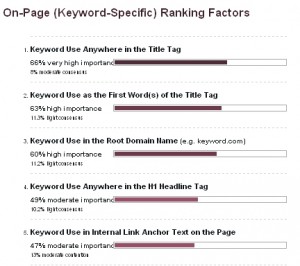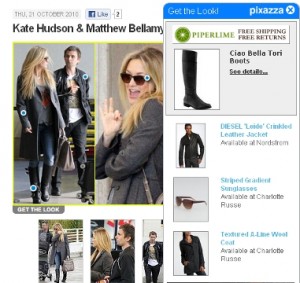Monday, 25. October 2010
I have been looking for a complete list of Search Ranking Factors and found this useful article on SEOMOZ.org. http://www.seomoz.org/article/search-ranking-factors#ranking-factors
This is the best one I have seen so far. According to SEOMOZ.org, it is based on input from their panel of 72 SEO experts. I have been trying to convince people that SEO is a specialty and if it were done right, it should not be taken lightly. There is the general notion that by changing a few things here and there will boost ranking but SEO has evolved greatly in the past few years. For example, one of the factors people tend to place important on is Meta Keywords. Historically, sites have abused Meta Keywords by stuffing it with lots of keywords. Today, Meta Keywords matters very little. As a matter of fact, it has a 5% very minimal importance according to the article. If you are struggling to tell your company that doing SEO is no simple task, this article can open some eyes.

Thursday, 21. October 2010
In-image advertising is not only clever but extremely relevant to customers. Now if you want to dress like a celebrity, you can easily find where to get the look with merchandise exactly matching what the celebrity was wearing. Take a look at the screen shot I took. The conversion rate could be substantially higher than OLA since the click on the Get the Look flap is presumably from customers with a clear and strong intent to shop for the celebrity look. Then in the ads where the exact matching items are shown speaks high relevancy. When you combine customer intent with highly relevant ad, the likelihood of purchase will be very high. This can be a more cost effective way to advertising as it can eliminate the waste that could be associated with relatively less targeted OLA method. In-image advertising is very cool and I am looking forward to seeing more to come with image-targeted advertising as well as some numbers around cost/benefit.

Wednesday, 20. October 2010
As I was searching for something on Google.com in a typical day, all of a sudden, I’m noticing something is different. The search results page were displaying different results on-the-fly as I’m typing out the keyword phrase. So for example, I was typing “big” then “apple” and then “circus”, the search results were changing when each keyword that is added to the phrase. My immediate reaction was that this is pretty neat but at the same time, after a few different searches, it was a bit annoying with distracting search keyword suggestions and the changing results that keep drawing my attention. The biggest claim from Google is that this new search behavior saves time. Maybe a bit chaotic at first but I’m getting used to it. Then I became curious about what impact this may have on SEO, particularly for single keyword searches. Most of the organic searches to our site tended to be our brand name. I would not be surprised if we see a decrease in single-keyword searches post-launch of Google Instant. It could also make page ranking very interesting for links that would rank on 2nd page or lower pre-Google Instant to now be on the 1st page. Additionally increasing search refinement with Google Instant could push search to an even longer tail with very specific phrases. This may be a good thing for business if people are exploring deeper searches thereby making them more qualifying customers.

To read more about Google Instant, click here.
Thursday, 14. October 2010
Many sites now have the Facebook Activity Feed integrated with their pages but how much activity is happening with it? We were recently challenged with this question and the solution to track clicks in the Activity Feed turned out to be quite straight forward. For instructions on how to track it, you can read the full documentation here: http://developers.facebook.com/docs/reference/plugins/activity
The key here is to include a parameter ref=”page_location” in the iframe source code that calls for the Activity Feed plugin. This parameter would then be appended to each link in the plugin in the form of fb_ref=”page_location” and would show up in the referrer URL. The page location value can be different (e.g. ref=”homepage” or ref=”sports homepage”according to the page the plugin is on. This way you can not only get total click activity on the plugin but also be able to break it down by page location in order to determine which page generate the most click activity.




